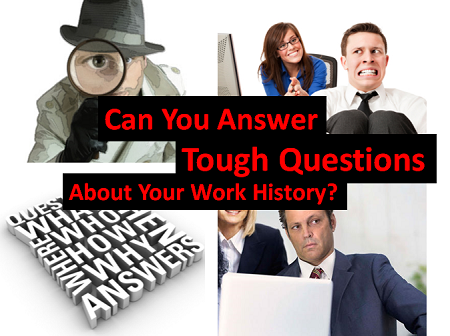Can You Answer Tough Questions About Your Work History?
Well, can you?
I’m a human resource professional and a resume writer, so this is something that I have to work with all the time. Whenever I get a new resume client one of the first things I do is coordinate a telephone call with them. I like to interview them and ask questions about their current resume. This helps when creating a resume that best fits the client’s personality and aspirations. Every once and while, I have to ask some “difficult” questions, to which I get some “interesting” responses. Those responses would not play well with an employer.
Everyone’s work history is different and represents a unique journey full of peaks and valleys. If you find yourself in the job market you will definitely have to explain those peaks and valleys.
We’ve all read the articles and seen the news reports of those who lie on their resumes. Even the smallest embellishment can paint you as a liar. Which brings us full circle and back to the main question - are you ready to answer questions about your resume, without being defensive, difficult or argumentative?
Here are some true examples
- I received a resume that had a quote from Jack Welch, the former CEO of GE and major business analyst. I asked the client, “Hey, are you a fan of Jack Welch?” to which he said “Who is that?” Apparently, he had a friend create the resume and he had not proof read it. He had no idea, imagine how embarrassing that could have been in an interview setting.
- I had another gentlemen that listed he was skilled in a certain accounting software. When I asked him how proficient he was with the software, he began to stutter and stammer, it was obvious he had no idea what that software was or how to use it. If was a recruiter or hiring manager, he would have been labeled a liar and screen-out.
- I had another client who was the GM of a business that owned with their spouse. Once their marriage ended it was difficult to find gainful employment. They wanted to know how to explain the drop-off in careers. This is tricky, because it’s personal and it’s sensitive. However, I explained that a divorce is common and they didn’t have to go into detail but when asked about it, to be honest – you had a personal setback – you had a family situation or just say, I went through a divorce. It’s ok.
- I have had several clients who have all the education in the world but can’t seem to move forward in there career and nail the interview process. I think this is a confidence issue. Confidence is everything in the job search. You have to be confident, honest and savvy. You have to be able to have a conversation and be sure to let the recruiter or hiring manager know you want that job and why you are the best for it.
When interviewing you don’t want to seem uncomfortable, unprepared or embarrassed. It’s important to read your resume from top to bottom and become comfortable explaining it each part.
If you have employment gaps, or transitioning to a new career use your cover letter or a career profile to explain your situation. But most importantly, be prepared to answer questions about your resume. So here’s my advice, don’t lie, don’t even embellish because lying on your resume – just doesn’t work out too well.
Need help? Join the ResumeCrusade, contact me ‘[email protected]’

 Follow
Follow